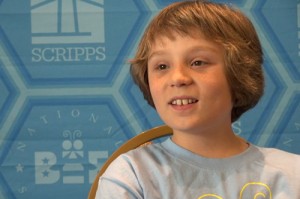WASHINGTON — “Stromuhr,” “cymotrichous,” “guetapens,” “Laodicean.”
These four words aren’t in the vocabulary of most adults, but 281 young students, including 14 from North Carolina, searching for a win at the this week’s Scripps National Spelling Bee need to know them, and others, stone cold.
“Practice makes perfect. Make sure you can remember them all the time,” said Brian Werden of Hillsborough. “Don’t just study till you think you know it. You have to master most the words, or all of them.”
Werden, a seventh-grader from Charles W. Stanford Middle School, is one of five students from the Triangle area participating in the bee. He is joined by Hunter Randolph of SanLee Middle School in Sanford; Alexander Schembra of Lillington-Shawtown Elementary in Lillington; Jesse Stephenson of Southside Christian School in Clayton and Ethan Wagner of St. Michael of the Archangel School in Cary.
Held every year since 1925, except during World War II, the bee draws elementary- and middle-school students to Fort Washington, Md., from all over the country and world to compete for a trophy and a cash prize, among other things.
To qualify, hopefuls must win a local qualifying spelling bee, and sometimes a regional or county competition. Students are eligible to compete multiple times. Hunter Randolph, an eighth-grader, will compete in the event for the third consecutive year.
“The first time was kind of surprising,” Randolph said. “I didn’t really expect to come here. I just kind coasted through… When I made it to the county bee, mom and dad were just kind of saying, ‘Oh, it’s okay if you don’t win.’?”
His first year, Randolph ended up in the final round of the qualifying match with his brother.
“It came down to he and another kid and me. He got out, and I pretty much got lucky,” he said.
Preliminary rounds take place Tuesday and Wednesday, followed by the semifinal and final rounds on Thursday.
All of the months of preparation and hours of daily practice come down to a little bit of luck and the students’ uncanny repository of words. To ensure good fortune is on his side, Alexander Schembra, a fifth-grader, wears his right sock inside out. He also has an unusual way of studying.
“I like writing the word, like, a hundred times – not really, more like five times,” he said, “and sing it a couple times, which might be embarrassing.”
Mercurial was Schembra’s magic word, the one that sent him to the national competition.
“Mercurial means to do something like fast or oblivious, like as fast as you want to,” he said, adding that the word’s meaning is derived from the planet because “it’s the fastest rotating around the sun.”
The competition and the words draw people for different reasons. Jesse Stephenson, a seventh-grader, likes the ability to create sincere and earnest sentences.
“Instead of saying just one word, you can combine them together and create something more meaningful and describe it to you,” he said. “Like, ‘I like to go fishing in the afternoon in the sunset of the day.’ It makes it more meaningful and colorful so you can create a picture in someone’s mind when you are talking to them.”
For Ethan Wagner, an eighth-grader, it runs in the family. His sister competed in the bee a couple years ago, tying for 47th place.
“I helped her study,” he said. “And I found I knew many of the words myself, and so I just decided to give it a try.”


